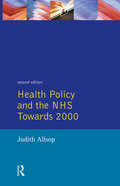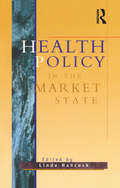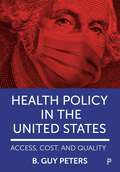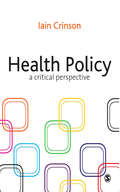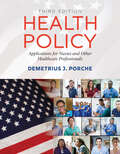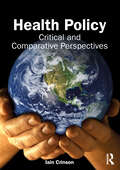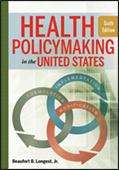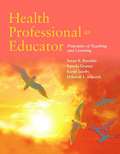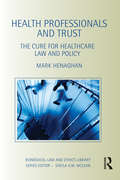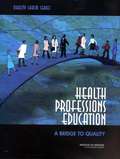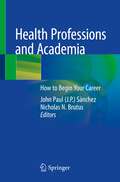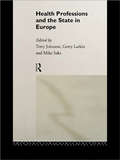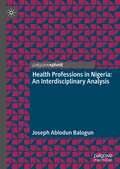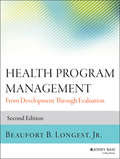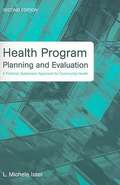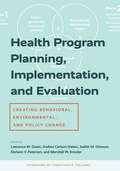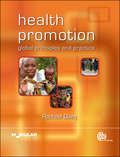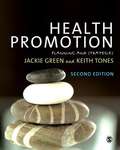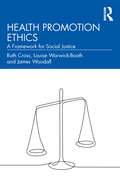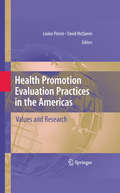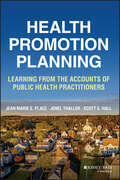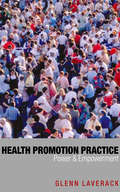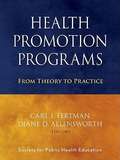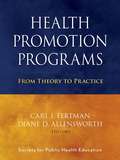- Table View
- List View
Health Policy and the Disadvantaged
by Lawrence D. BrownThis important collection of essays, originating in a 1989 conference on the disadvantaged in American health care, provides incisive commentary on U.S. health care policy and politics. Examining public responses to health crises and analyzing the political logic of the American community, this volume charts the immobility of U.S. health policy in recent years and points to its disastrous consequences for the 1990s.Focusing on the particular needs of disadvantaged groups--the elderly, children, people with AIDS, the mentally ill, the chemically dependent, the homeless, the hungry, the medically uninsured--these essays develop strong policy statements. The authors describe the growth in U.S. health care programs, from Kerr-Mills to Medicare, Medicaid, and subsequent revisions, and stress the serious omissions resulting from incremental policy expansion, both in identifying disadvantaged groups and in implementing programs. They report the weakness of the U.S. health care system compared to systems of other technologically developed countries.Contributors. Deborah A. Stone and Theodore R. Marmor, Judith Feder, Alice Sardell, Bruce C. Vladeck, Michael Lipsky and Marc A. Thibodeau, Daniel M. Fox, William E. McAuliffe, M. Gregg Bloche and Francine Cournos, Lawrence D. Brown, James A. Morrone
Health Policy and the NHS: Towards 2000 (Longman Social Policy In Britain Series)
by Judith AllsopHealth Policy and the NHS provides a thorough and up-to-date review of the changes in the structure and organisation of the health service. It focuses on how sucessive governments have approached problems of health care, their policy assumptions and the economic and political context of their decision making. Divided into four parts the text considers in turn: the foundations and framework of the NHS, policy issues within the NHS that dominated the government's policy agenda until the late 1980s, health and society and the critiques of health policy which developed in the late 1970s and 1980s, and new directions for health policy in the future.
Health Policy in the Market State
by Linda HancockAt a time of increasing demands on budgets, governments around the world are seeking to reduce health expenditure and introduce market-oriented reforms to the health sector. This is leading to profound shifts in the relationship between the state and the individual, as policy makers dismantle the welfare state and move towards a user-pays sytem.Health Policy in the Market State offers an overview of health policy in Australia, locating it within the broader context of power and interests analysis and shifts in government policy and public sector restructuring. It outlines the key issues in current health policy and assesses the strengths and weaknesses of specific policies and programs.Contributors include Ian Anderson and Maggie Brady, Mary Draper, Stephen Duckett, Liz Eckerman, Sophie Hill, Sharon Moore, Michael Muetzelfeldt, Janine Smith and Beth Wilson.Health Policy in the Market State is a valuable overview for students, as well as a comprehensive reference for health professionals and policy-makers.
Health Policy in the United States: Access, Cost and Quality
by B. Guy PetersWritten by a well-respected health and public policy expert, this book provides a comprehensive exploration of the under-appreciated role of public health policy in the United States’ medical care industry. The book offers students: • an introduction to the fundamentals of health policy, with comparative perspectives from other countries; • analysis of major health care programmes, including Medicare, Medicaid, the Affordable Care Act and regulatory programs; • reflections on issues around access, quality, cost, and the ethics of provision. By drawing comparisons between the US and other countries, it deepens our understanding of health policy in the US, where it is headed next, and what it might learn from other systems.
Health Policy: A Critical Perspective
by Dr Iain CrinsonThis textbook provides a critical assessment of developments in health and healthcare policy within the UK and Europe. Each chapter integrates conceptual themes drawn from the fields of sociology and political science to offer a unique combination of theory, historical detail and wider social commentary. The book is divided into four sections: - Section One establishes a theoretical basis for the analysis of contemporary health policy. - Section Two examines the key constituents of health care 'systems', which includes a comparative analysis of EU member states. - Section Three focuses on contemporary health care policy and provision in the UK. - Section Four assesses the increasingly limited ability of national governments to reduce threats to the health of their populations. Written in an accessible style, the student-friendly approach highlights key concepts and includes introductions, summaries and examples of further reading. Each chapter also includes case studies and activities which encourage the reader to think about the planning, implementation and assessment of specific healthcare policies. This is a timely and authoritative textbook that covers a key topic of the curriculum while also contributing to topical debates. The book will be essential reading for healthcare and social science students taking modules in health policy, and will also be of interest to policy makers and practitioners in the field of healthcare.
Health Policy: Application for Nurses and Other Healthcare Professionals
by Dr. Demetrius PorcheHealth Policy: Application for Nurses and Other Health Care Professionals, Third Edition provides an overview of the policy making process within a variety of settings including academia, clinical practice, communities, and various health care systems.
Health Policy: Critical and Comparative Perspectives
by Iain CrinsonThis important new textbook provides comparative and critical analysis of health care policy from high-income countries in Europe to low-income developing countries in the Global South.It integrates conceptual themes drawn from the fields of sociology, policy analysis, and political science to offer a unique combination of theory, historical background, and wider social commentary. The book is divided into three sections: Section I establishes the conceptual basis for the analysis of the health policymaking process, including implementation. Section II provides an introduction to the key elements of conducting a comparative health system’s analysis, including chapters that provide examples of performance analysis in both high- and low-income developing countries. Section III examines key challenges now facing health policy-makers that include long-term social care provision, widening the scope of public health to address social inequalities in health outcome, the integration of genomic medicine within a health care system, and the establishment of an effective national pharmaceutical policy. Each chapter includes case studies, historical-institutional contexts, and summaries of key health policies. Detailed and clearly written, it is the ideal text for health and social science students in this expanding area of analysis.
Health Policymaking In The United States (Sixth Edition)
by Beaufort B. Longest Association of University Programs in Health Administration StaffThis book will demystify the complicated process of health policymaking. It provides a framework for putting the various aspects of policymaking into perspective and provides you with the background knowledge you need to understand the political environment. You will also learn techniques used to influence the policymaking process. Key aspects of this process are brought to life through many real-world excerpts from congressional testimony, news stories, and executive orders.
Health Professionals As Educator: Principles Of Teaching And Learning
by Karen Jacobs Susan Bastable Pamela Gramet Deborah SopczykNever HIGHLIGHT a Book Again! Includes all testable terms, concepts, persons, places, and events. Cram101 Just the FACTS101 studyguides gives all of the outlines, highlights, and quizzes for your textbook with optional online comprehensive practice tests. Only Cram101 is Textbook Specific. Accompanies: 9780763792787. This item is printed on demand.
Health Professionals and Trust: The Cure for Healthcare Law and Policy (Biomedical Law and Ethics Library)
by Mark HenaghanAn ever increasing number of codes of conduct, disciplinary bodies, ethics committees and bureaucratic policies now prescribe how health professionals and health researchers relate to their patients. In this book, Mark Henaghan argues that the result of this trend towards heightened regulation has been to undermine the traditional dynamic of trust in health professionals and to diminish reliance upon their professional judgement, whilst simultaneously failing to trust patients to make decisions about their own care. This book examines the issue of health professionals and trust comparatively in a number of countries including the USA, Canada, Australia, New Zealand and the UK. The book draws upon historical analysis of legislation, case law, disciplinary proceedings reports, articles in medical and law journals and protocols produced by management teams in hospitals, to illustrate the ways in which there has been a discernable shift away from trust in healthcare professionals. Henaghan argues that this erosion of trust has the potential to dehumanise the unique relationship that has traditionally existed between healthcare professionals and their patients, thereby running the risk of turning healthcare into a mechanistic enterprise controlled by a ‘management processes' rather than a humanistic relationship governed by trust and judgement. This book is an invaluable resource for students and scholars of medical law and medical sociology, public policy-makers and a range of associated professionals, from health service managers to medical science and clinical researchers.
Health Professions Education: A Bridge to Quality
by Ann C. Greiner Elisa KnebelThe Institute of Medicine study Crossing the Quality Chasm (2001) recommended that an interdisciplinary summit be held to further reform of health professions education in order to enhance quality and patient safety. Health Professions Education: A Bridge to Quality is the follow up to that summit, held in June 2002, where 150 participants across disciplines and occupations developed ideas about how to integrate a core set of competencies into health professions education. These core competencies include patient-centered care, interdisciplinary teams, evidence-based practice, quality improvement, and informatics. This book recommends a mix of approaches to health education improvement, including those related to oversight processes, the training environment, research, public reporting, and leadership. Educators, administrators, and health professionals can use this book to help achieve an approach to education that better prepares clinicians to meet both the needs of patients and the requirements of a changing health care system.
Health Professions and Academia: How to Begin Your Career
by John Paul J. P. Sánchez Nicholas N. BrutusThis book increases undergraduate and graduate students' awareness of, interest in, and preparedness for academic health professions careers. It includes invaluable chapters that emphasize the importance of developing self-efficacy, knowledge, skills, and experiences not just for their resume but to build a foundation to strengthen students for the rest of their professional careers.The book provides the reader with basic information, tools, and a competitive edge through inspirational narratives from diverse graduate students and faculty, self-assessment exercises, and case-based discussion. These invaluable, authentic narratives will inspire, hearten, and encourage readers to pursue their health professional and academic careers confidently. Additionally, chapters outline the necessary tools for getting the most out of one's educational, research, service and leadership activities and optimize their competitiveness for graduate school and as pre-faculty.Unique, timely, and comprehensive, Health Professions and Academia provides undergraduate and graduate students with content to develop as competitive applicants to health-related graduate school and build a foundation from which they can establish successful careers in academia as future faculty, senior administrative leaders, and change agents.
Health Professions and the State in Europe
by Terry Johnson Mike Saks Gerry LarkinMany professions today are in a state of transition, with changes being imposed on them by governments and other agencies. Focusing on this theme of change Health Professions and the State in Europe explains and illuminates the specific relationship between health professions and the state. The editors and contributors, all experts in the field, present an overview of the current situation in eight different countries in Europe, covering such topical issues as the impact on the health professions of market policies, performance and quality measures, and challenges to professional monopolies and expertise. With its international and comparative perspective, the book enhances our understanding of the interplay between health professions and the state in different national contexts.
Health Professions in Nigeria: An Interdisciplinary Analysis
by Joseph Abiodun BalogunThis book provides a unique assessment of the Nigerian healthcare system's different professions. It begins by examining the fundamentals of health professions to contextualize the issues explored in the book in more detail. It goes on to present the hierarchy of occupations, professionalization, and the evolutionary path and socialization milestones that occupations attempting to attain true professions' status and power transcend. It also analyses the differences between professional autonomy, direct access, and independent practice. The latter parts identify Nigeria's primary healthcare professions and vocational careers and discuss their central roles, each discipline's specialty; including the biography of 35 notable pioneer Nigerian healthcare professionals during the 19th and early 20th centuries. The book concludes by analyzing the causes and adverse impacts of interprofessional conflict and industrial action within the Nigerian healthcare system and proposes the interdisciplinary team concept as a panacea for both conundrums.
Health Program Management: From Development Through Evaluation (Jossey-Bass Public Health)
by Beaufort B. Longest Jr.Learn how to effectively plan, implement, and evaluate health programs Health Program Management: From Development Through Evaluation, Second Edition is a practical and useful introduction to the management of health programs. While providing an overview of the current best practices in management, the textbook goes beyond simple management techniques, teaching students how to develop, lead, and evaluate their programs to ensure quality outcomes. The focus is on the three core management concepts of strategy, design, and leadership, but time is also devoted to describing facilitative management activities integral to successful programs. Students will learn techniques for communication, decision-making, quality assurance, marketing, and program evaluation within the structure of the book's program management model. Logically organized with a separate chapter for each activity, this resource provides a thorough, systematic overview of the effective development, implementation, and evaluation of health programs. Health Program Management: From Development Through Evaluation, Second Edition provides a comprehensive approach to management throughout all stages of a health program. Learn to develop a strategy that steers the program toward specific goals Discover how to design, market, and lead an effective health program Become familiar with the manager's role in a quality health program Evaluate potential and existing programs for performance and capability Students and aspiring managers and leaders preparing themselves for the challenges of managing health programs will find the information and techniques to develop the skills they need in Health Program Management: From Development Through Evaluation, Second Edition.
Health Program Planning and Evaluation: A Practical and Systematic Approach for Community Health
by L. Michele IsselThe Second Edition of Health Program Planning and Evaluation will help you to systematically develop, thoughtfully implement, and rigorously evaluate health programs across a variety of health disciplines. This thorough revision includes updated examples and references throughout, reflecting the major changes within the field. This outstanding resource prepares students and professionals to become savvy consumers of evaluation reports and prudent users of evaluation consultants. It presents practical tools and concepts in language suitable for both the practicing and novice health program planner and evaluator.
Health Program Planning, Implementation, and Evaluation: Creating Behavioral, Environmental, and Policy Change
by Lawrence W. Green, Andrea Carlson Gielen, Judith M. Ottoson Darleen V. Peterson and Marshall W. KreuterA time-tested, landmark approach to health promotion and communication projects and everything that goes into making them successful.For more than 40 years, the PRECEDE-PROCEED model, developed in the early 1970s by Lawrence W. Green and first published as a text in 1980 with Marshall W. Kreuter, Sigrid G. Deeds, and Kay B. Partridge, has been effectively applied worldwide to address a broad range of health issues: risk factors like tobacco and lack of exercise, social determinants of health such as lack of access to transportation and safe housing, and major disease challenges like heart disease and guinea worm disease. In Health Program Planning, Implementation, and Evaluation, Green and his team of senior editors and chapter authors combine their expertise to offer a high-level guide to public health programming. This guide aligns with foundational public health competencies required by increasingly rigorous certification and accreditation standards. Driven by the coronavirus pandemic and a looming climate crisis, the book addresses the rapid changes in modern-day conceptions of disease prevention and health promotion.Today's public health practitioners and researchers are often called upon to address a complex web of factors, including population inequities, that influence health status, from biology to social and structural determinants. Program and policy solutions to population health challenges require systematic planning, implementation, and evaluation. Providing students with knowledge, skills, and a range of tools, the book recognizes new approaches to communication and fresh methods for reaching a greater diversity of communities.The authors highlight the importance of starting the population health planning process with an inclusive assessment of the social needs and quality-of-life concerns of the community. They explain how to assess health problems systematically in epidemiological terms and address the behavioral and environmental determinants of the most important and changeable health problems. They also cover procedures for assessing and developing the capacity of communities and organizations to implement and evaluate programs. Drawing on more than 1,200 published applications of the PRECEDE-PROCEED model, Health Program Planning, Implementation, and Evaluation features numerous case studies and contributions from internationally recognized experts, including governmental, academic, and community public health leaders, giving readers a thorough and well-rounded view of the subject. Ultimately, it is an up-to-date powerhouse for community and global health promotion at all levels. Contributors: Faten Ben Abdelaziz, John P. Allegrante, Patricia Chalela, Cam Escoffery, Maria E. Fernandez, Jonathan E. Fielding, Robert S. Gold, Shelly Golden, Holly Hunt, Vanya C. Jones, Michelle C. Kegler, Gerjo Kok, Lloyd J. Kolbe, Chris Y. Lovato, Rodney Lyn, Guy Parcel, Janey C. Peterson, Nico Pronk, Amelie G. Ramirez, Paul Terry
Health Promotion
by Louise Warwick-Booth Ruth Cross Diane Lowcock Skye Hughes Rachael Dixey Ivy O'Neil Sally FosterHealth promotion is a key mechanism in tackling the foremost health challenges faced by developing and developed nations. Covering key concepts, theory and practical aspects, this textbook focuses on the themes central to contemporary health promotion practice on a global scale. Social determinants, equality and equity, policy and health, working in partnerships, sustainability, evaluation and evidence-based practice are detailed, and the critical application of health promotion to practice is outlined throughout the book. With contributions from the Centre for Health Promotion Research team at Leeds Metropolitan University, the author shows how ideas drawn from social science can aid health promotion theory and practice in complex, real-life situations, drawing upon international settings and teaching experience in the global North and South, finishing with a summary of the future directions of professional health promotion practice. Placing a strong emphasis on a global context, this book provides an accessible and engaging resource for postgraduate students of health promotion, public health nursing and related subjects, health practitioners and NGOs.
Health Promotion
by Jackie Green Keith Tones`This book makes an important contribution to the growing literature in the health promotion arena, with its comprehensive coverage of contemporary philosophical, research and practice issues. The healthy public policy chapter provides the best treatment of this topic I have read' - Professor Maurice B Mittelmark, University of Bergen, Norway and President of the International Union of Health Promotion and Education `This book advances a fresh proposition, rather than rehashing the standard theories that we have read endless times… it sets out a "New Health Education", which has shaken off its victim blaming shackles, and focus on individual behaviour, to truly complement the aims of health promotion' - National Oral Health Promotion Group Journal `Keith Tones has, over the years, provided a solid theoretical framework for health promotion, with successive texts on the subject. This latest publication continues the trend, with a systematic layout and thorough review of health promotion issues… The text has a wide appeal to a wider audience, ranging from public health practitioners and health promotion specialists, to health and social care students at postgraduate level' - RCN Research Headlines 'Whether you area student exploring health promotion for the first time, or an experienced practitioner developing your knowledge, this text will provide you with a clear and comprehensive resource… this is not a heavy tome full of complex language; rather it is a very articulate examination of a wide range of aspects of health promotion, presented in a clear and easily understood way' - Journal of Community Nursing Health Promotion is written for all professionals who strive to improve the health of others. Beginning with a critical appraisal of the concept itself, the book outlines new models for defining `health promotion' and sets out the factors involved in planning health promotion programmes that work. The authors describe detailed strategies for action and show how these can be applied within a range of contexts and settings. In an attempt to bridge the gap that persists between ideological perspectives and practical implementations, they delve beyond the rhetoric of empowerment and show how it can be incorporated into practice. Focusing particularly on the synergistic relationship between policy and education, the book re-appraises the notion of health education - an idea which has become marginalised in recent years- and shows the fundamental importance of education in creating individual choice and generating effective advocacy for social change. The question of `evidence' is central to the text and the book concludes by examining methods of evaluation and the role it plays in creating more effective health promotion programmes.
Health Promotion Ethics: A Framework for Social Justice
by Louise Warwick-Booth James Woodall Ruth CrossHealth Promotion Ethics: A Framework for Social Justice critically considers the ethical dimensions of promoting health with individuals and communities, encouraging a nuanced understanding of health promotion in the context of fairness, empowerment and social justice. The concept of social justice, indeed, is central. The book explores how health promotion should be considered in relation to moral, social and legal issues, from individual responsibility to government intervention, as well as the possibility that existing practice maintains rather than alleviates existing health inequalities by stigmatising certain groups. It also questions the ‘rights’ of those who promote health to use particular strategies, for example using fear to encourage behaviour change. The ethics of health promotion practice and research are considered, introducing several important debates. Case studies, international material and opportunities to reflect on practice are used throughout to bring the important issues under discussion to life, engaging both students and practitioners alike. The book provides a fascinating route to reflect on what it really means to promote health for all in a more equitable way.
Health Promotion Evaluation Practices in the Americas
by David V. Mcqueen Louise PotvinMore and more, health promotion is a crucial component of public health, to the extent that public health interventions are called on to prove their effectiveness and appraised for scientific validity, a practice many in the field consider self-defeating. Health Promotion Evaluation Practices in the Americas cogently demonstrates that scientific rigor and the goals of health promotion are less in conflict than commonly thought, synthesizing multiple traditions from countries throughout North, Central, and South America (and across the developed-to-developing-world continuum) for a volume that is both diverse in scope and unified in purpose. The book's examples--representing robust theoretical and practical literatures as well as initiatives from Rio de Janeiro to American Indian communities--explain why health promotion evaluation projects require different guidelines from mainstream evaluative work. The editors identify core humanitarian principles associated with health promotion (participation, empowerment, equity, sustainability, intersectoral action, multistrategy, and contextualism), while chapters highlight challenges that must be mastered to keep these principles and scientific objectives in sync, including: (1) Building health promotion values into evaluation research projects. (2) Expanding the use of evaluation in health promotion. (3) Developing meaningful evaluation questions. (4) Distinguishing between community-based participation research and evaluation-based participation. (5) Evaluating specifically for equity. (6) Designing initiatives to foster lasting social change. The applied knowledge in Health Promotion Evaluation Practices in the Americas: Values and Research can bring the goals of intervention into sharper focus for practitioners, evaluators, and decision-makers and facilitate communication on all sides--necessary steps to progress from study findings to real-world action.
Health Promotion Planning: Learning from the Accounts of Public Health Practitioners
by Jean Marie Place Jonel Thaller Scott S. HallHEALTH PROMOTION PLANNING “I find this book to be an invaluable resource, offering a comprehensive guide for assessing and addressing public health issues. Its unique blend of theoretical insights and real-world narratives provides a nuanced understanding of interventions in practical contexts. This book is an essential tool for both current and aspiring professionals in the public health sector.” —DANE MINNICK, Indiana Division of Mental Health and Addiction Real stories, real solutions—a unique textbook that embeds definitions and descriptions of program planning principles within the story of one town grappling with the opioid crisis In Health Promotion Planning: Learning from the Accounts of Public Health Practitioners, you will embark on a journey through the heart of a small midwestern city, where a community grapples with the daunting challenges of the opioid epidemic. The book uses narratives in a creative and engaging way, weaving together the real-life accounts of over 100 public health practitioners. As you follow the saga of the town, you will see program planning principles in action. Through the intricacies of substance use and opioid-related challenges, this book sheds light on the interconnected efforts of diverse programs, including needs assessment, health education curriculum, health communication campaigns, environmental change strategies, peer support initiatives, and community organizing. Students and practitioners will uncover the principles and processes of building health promotion programs. Discussion questions and activities at the end of each chapter stimulate reflection and exploration, offering a valuable resource for instructors and individual learners. Health Promotion Planning is a powerful glimpse into public health practice, inspiring future generations to take up the mantle in addressing societal challenges. Learners will witness health promotion in action as they follow the compelling stories inside—where lessons are learned, lives are changed, and hope emerges from the frontlines of a devastating epidemic.
Health Promotion Practice: Power and Empowerment
by Glenn Laverack′This book, written from an international perspective and thus eminently readable by a wider audience, draws on the author′s considerable experience and is amply supplied with a good range of illustrations from real-life practice…The logical structure and accessible style makes this a useful addition to the personal library of anyone who has an interest in "bottom-up" empowerment-based approaches to health promotion′ - RCN Research Headlines ′The author draws on a wealth of personal experiences in the field, giving the book both readability and credibility. Good examples from different international contexts, illustrated in relevant case studies, let the reader relate theory to practice and bring the concepts to life. The author takes the central thrust of health promotion for the past few decades and unravels it for the reader in a clear, comprehensive way′ - Health Matters In health promotion, the concept of power can be defined as the ability to create or resist change, and this is an important foundation for individual and community health. By enabling people to empower themselves, health promoters can provide the capacity for the individual or community to change their lives and their living conditions, and therefore their health. Health Promotion Practice explores the issue of how such an approach to health promotion practice can improve a community′s success towards achieving healthier conditions through its own actions. Placing empowerment at the heart of health promotion practice, and offering advice for health promoters who accept the challenge to work in such a way, Health Promotion Practice defines key concepts of health, health promotion and community empowerment. It also: Introduces readers to a ′social′ model of health promotion practice, one that attempts to get at the underlying social determinants of disease; Helps readers understand the importance of power relations and their transformation in this practice; Introduces readers to a new `community capacity-building′ approach to plan, implement and evaluate health promotion programmes. Health Promotion Practice is an invaluable resource to students and practitioners of health promotion who want to help empower the communities that they work with.
Health Promotion Programs
by Carl I. Fertman Diane D. Allensworth Society for Public Health EducationHealth Promotion Programs introduces the theory of health promotion and presents an overview of current best practices from a wide variety of settings that include schools, health care organizations, workplace, and community. The 43 contributors to Health Promotion Programs focus on students and professionals interested in planning, implementing, and evaluating programs that promote health equity. In addition to the focus on best practices, each chapter contains information on: Identifying health promotion programs Eliminating health disparities Defining and applying health promotion theories and models Assessing the needs of program participants Creating and supporting evidence-based programs Implementing health promotion programs: Tools, program staff, and budgets Advocacy Communicating health information effectively Developing and increasing program funding Evaluating, improving, and sustaining health promotion programs Health promotion challenges and opportunities Health promotion resources and career links "The authors have clearly connected the dots among planning, theory, evaluation, health disparity, and advocacy, and have created a user-friendly toolbox for health promotion empowerment."-Ronald L. Braithwaite, PhD, professor, Morehouse School of Medicine, Departments of Community Health and Preventive Medicine, Family Medicine, and Psychiatry "The most comprehensive program planning text to date, this book examines all facets of planning and implementation across four key work environments where health educators function."-Mal Goldsmith, PhD, CHES, professor and coordinator of Health Education, Southern Illinois University, Edwardsville"Health Promotion Programs . . . . explores the thinking of some of our field's leaders and confirms its well-deserved place in the field and in our personal collections."-Susan M. Radius, PhD, CHES, professor and program director, Health Science Department, Towson University
Health Promotion Programs: From Theory to Practice
by Carl I. Fertman Diane D. Allensworth Society for Public Health Education StaffHealth Promotion Programs introduces the theory of health promotion and presents an overview of current best practices from a wide variety of settings that include schools, health care organizations, workplace, and community. The 43 contributors to Health Promotion Programs focus on students and professionals interested in planning, implementing, and evaluating programs that promote health equity. In addition to the focus on best practices, each chapter contains information on: Identifying health promotion programs Eliminating health disparities Defining and applying health promotion theories and models Assessing the needs of program participants Creating and supporting evidence-based programs Implementing health promotion programs: Tools, program staff, and budgets Advocacy Communicating health information effectively Developing and increasing program funding Evaluating, improving, and sustaining health promotion programs Health promotion challenges and opportunities Health promotion resources and career links "The authors have clearly connected the dots among planning, theory, evaluation, health disparity, and advocacy, and have created a user-friendly toolbox for health promotion empowerment. "-Ronald L. Braithwaite, PhD, professor, Morehouse School of Medicine, Departments of Community Health and Preventive Medicine, Family Medicine, and Psychiatry "The most comprehensive program planning text to date, this book examines all facets of planning and implementation across four key work environments where health educators function. "-Mal Goldsmith, PhD, CHES, professor and coordinator of Health Education, Southern Illinois University, Edwardsville "Health Promotion Programs . . . . explores the thinking of some of our field's leaders and confirms its well-deserved place in the field and in our personal collections. "-Susan M. Radius, PhD, CHES, professor and program director, Health Science Department, Towson University

